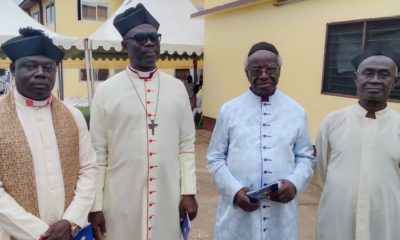By Osei Banahene Antoinette

TB Joshua, Source: Oberver
While scrolling through Twitter some time ago, I came across a post featuring a picture of Bisola accompanied by a caption that caught my attention: “When I saw this woman, I knew everything BBC has produced was lies.” Intrigued by this assertion, I delved into the documentary referenced, only to be astounded by its contents.

Jim Jones, source: SF GATE
Though initially taken aback, I couldn’t help but reflect on the parallels with other documentaries highlighting certain things that happen within the church environment. Instances such as those depicted in the BBC documentary are sadly not unprecedented; tales of figures like Jim Jones of the “Jones Town Massacre”, Jung Myung-Seok of the “In the Name of God” documentary, Warren Jeffs of the “Fundamentalist Latter Dat Saints Church”, and Peter Puppoff well known for faking prophesies serve as grim reminders of the certain things that happen that happen within the church setting.
However, I reached the peak of my interest when I stumbled upon BBC Africa’s documentary titled “Disciples of TB Joshua”. I was taken aback when I saw the thumbnail because I thought to myself, “clearly this is a man who does no wrong”.
TB Joshua was a tele evangelist, a philanthropist, friend to the poor and needy with his favorite cache phrase “LET LOVE LEAD”, indeed clearly this man can do no wrong. However, upon viewing the documentary with an open mind, I found myself contending with questions surrounding the distinction between sin and crime within the context of the church.
The fact that the leaders depicted in the aforementioned documentaries were prosecuted, found guilty, and held accountable by the law prompted me to ponder the Scriptural and legal boundaries that guide the church.
The church, as a body, draws its direction, guidance, and sustenance from the Word of God, encapsulated in the Bible. This fundamental principle underscores that the complexities of how the church should navigate life as explicitly outlined in the Bible. Consequently, the Bible functions as a comprehensive manual for the establishment and flourishing of the church.
Therefore, in explaining the concept of sin, Rev. Osafo Asante of the Goodnews Bible Church, described the concept in two ways. He first defined sin as the absence of faith, particularly in the context of salvation. However, in alignment with our discussion, he highlighted a more pertinent definition: “Sin is a transgression of the law.” He explained this notion by referencing 1st John chapter 3 verse 4, which states that “Whosoever committeth sin transgresseth also the law: for sin is the transgression of the law”.
Moreover, he highlighted the connection between sin and crime, noting that offenses against the law can simultaneously constitute both sin and crime. This convergence occurs when the laws of the land and scriptural principles align, emphasizing that transgressing such laws carries both moral and legal implications. In essence, he highlights that adherence to both biblical teachings and legal statutes is essential for guiding individual conduct and fostering a just society.
In agreement with Rev. Asante’s explanation, a young pastor, (who prefers to remain anonymous), established the fact that sin is an offense against God whereas crime is an offense against the state. Hence, when addressing cases of crimes within the church, it is incumbent upon the church to allow the legal process to unfold fully. The church’s role in such instances is primarily to offer support to the accused individual, recognizing them as one of their own. This support aims to encourage the alleged offender, providing them with a sense of solidarity and assistance in their journey towards restoration.
This holistic approach entails implementing a structured program encompassing biblical teachings, counseling, and skills training, all aimed at facilitating the individual’s reintegration into society. By extending such support and guidance, the church endeavors to contribute to the rehabilitation and eventual societal reintegration of the alleged offender.In conclusion, the examination of sin, crime, and the role of the church in addressing such issues unveils the difficulty of navigating moral and legal boundaries within religious contexts. As highlighted by Rev. Osafo Asante and echoed by the anonymous young pastor, sin and crime intersect where both biblical principles and legal statutes converge.
The church’s duty extends beyond spiritual guidance to encompass support, rehabilitation, and reintegration for those involved in criminal acts. Through a holistic approach rooted in biblical teachings and legal accountability, the church strives to uphold justice while fostering forgiveness and restoration. Ultimately, this reflection serves as a reminder of the imperative that while crimes may be prevalent in the world, there is an expectation for the church to uphold certain standards. It is also a reminder that church is filled with people from the world who are being transformed by the Word of God.

 Entertainment2 years ago
Entertainment2 years ago
 News2 years ago
News2 years ago
 News2 years ago
News2 years ago
 News2 years ago
News2 years ago
 News2 years ago
News2 years ago
 News1 year ago
News1 year ago
 Uncategorized2 years ago
Uncategorized2 years ago
 Politics2 years ago
Politics2 years ago




